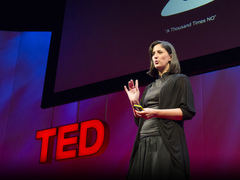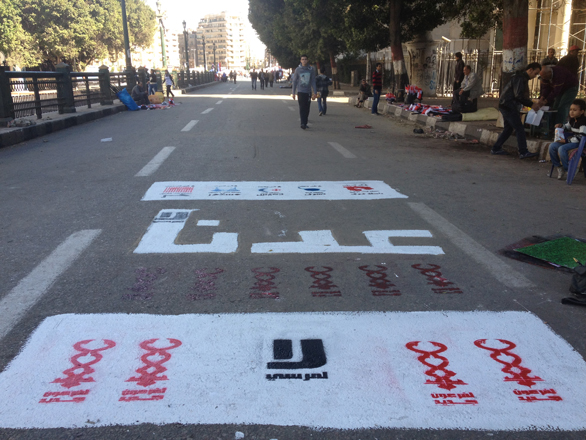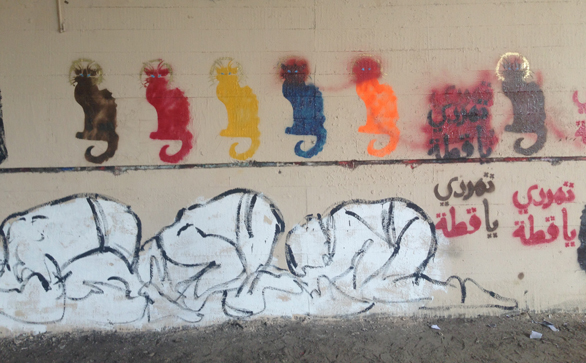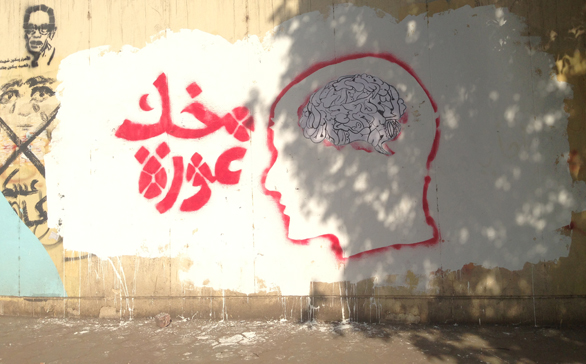 Bahia Shehab: A thousand times no
TED Fellow Bahia Shehab is an Egyptian artist who, at TEDGlobal 2012, shared her love of the Arabic phrase “No and a thousand times no,” boldly revealing that she had been stenciling the words on the streets of Cairo following the revolution of 2011, saying “no to military rule,” “no to burning books,” and “no to violence.” As protests were revived in Egypt this week — and as President Mohammed Mursi was ousted and his constitution suspended — we asked Shehab to share what she sees happening in her country, during what she calls an “exhilarating, anxious, and exciting time.”
Bahia Shehab: A thousand times no
TED Fellow Bahia Shehab is an Egyptian artist who, at TEDGlobal 2012, shared her love of the Arabic phrase “No and a thousand times no,” boldly revealing that she had been stenciling the words on the streets of Cairo following the revolution of 2011, saying “no to military rule,” “no to burning books,” and “no to violence.” As protests were revived in Egypt this week — and as President Mohammed Mursi was ousted and his constitution suspended — we asked Shehab to share what she sees happening in her country, during what she calls an “exhilarating, anxious, and exciting time.”
After last summer’s democratic elections in Egypt, I thought that I would never have to take to the streets of Cairo to spraypaint messages again. But Mursi lost the sympathy and support of the Egyptian people in November of 2012, although the rest of the world unfortunately did not notice. A flawed constitution and a series of dictatorship declarations by the president inspired millions of Egyptians to take to the streets on December 7, 2012. His actions made me go down again to Tahrir to paint the following message on the road leading up to the square: “We are back. No to a new Pharaoh, No to Mursi.”

What happened this week in Egypt is not a surprise to the believers in the revolution in this country. Tamarod is a grassroots movement that has been collecting signatures of people who did not support the Muslim Brotherhood regime for the past two months. Twenty two million people signed the petition. Thirty three million people are estimated to have protested on June 30 and July 1 all over Egypt.
This time around, I decided to finish my work on the street before the rallies. I was sure the squares would be full and I just wanted to enjoy the euphoria of the revolution — I did not want to spray. So I went to work on June 7, aiming to feminize the act of rebellion with my art. “Tamaradi ya Outta” or “Rebel Cat” was a call to women to join the revolution. I feminized the verb “to rebel,” so more women could relate to it, and I added the word “cat,” a howl that men sometimes call to women on the street. I painted the cat with a halo in many colors along with the slogan.

We Egyptians are not naïve enough to believe that things will become better overnight, the minute we elect a new president. We all agree that we are in a constant state of learning. Everyone learned a lesson in the past two years. The army came to understand that they are not fit to rule over civil society. The police learned that they need the support of the people. The people learned that those who buy their voices in the ballots for a bag of sugar or a bottle of oil will not necessarily have the best interests of the country in mind, and that religion should never be used in political agendas. But the most important lesson of all was clearly laid out for any future president of Egypt. Anyone who is going to sit on that chair knows now for certain that the real power is with the people. The Egyptian people will never leave the squares again.
One of the reasons I decided to target my work at women this time is the aggressive, organized, and targeted sexual harassment campaigns that were employed by followers of the Muslim Brotherhood to intimidate the women of Egypt from going down to protest in the squares. They tried to intimidate half the population to keep them away from the street. But the women of Egypt are the heart of the revolution. On June 30, 2013, women went down with their children to the squares in their millions and, after seeing that, I knew we couldn’t lose. The most beautiful scene from Tahrir this time is the women’s zone that is surrounded by men to protect them from any harassment. The most beautiful chants came ringing from this section, from the voices of these women who know that they are the core of the revolution.
On June 7, I sprayed another message, a message to the men who want to silence and intimidate the women of Egypt. A message to the men who claim that the voice, the hair, the body and the face of a woman is an “awra”, a shameful thing that should be covered. I sprayed a big brain composed of naked women body parts with the message “Mokhak Awra.” “Your brain is shameful and it should be covered.”

Freedom is addictive. After the events of the past three days, I am sure that no one will stop going down to the streets again to express dissatisfaction. Keep an eye out for Egypt in the near future. The land of the pharaohs will not produce another dictator. The time has come for the land of the Nile to produce a new breed of pharaohs; pharaohs of democracy, pharaohs of culture and pharaohs of knowledge.
German speakers may be interested in watching this documentary about Shehab’s latest campaigns »
Comments